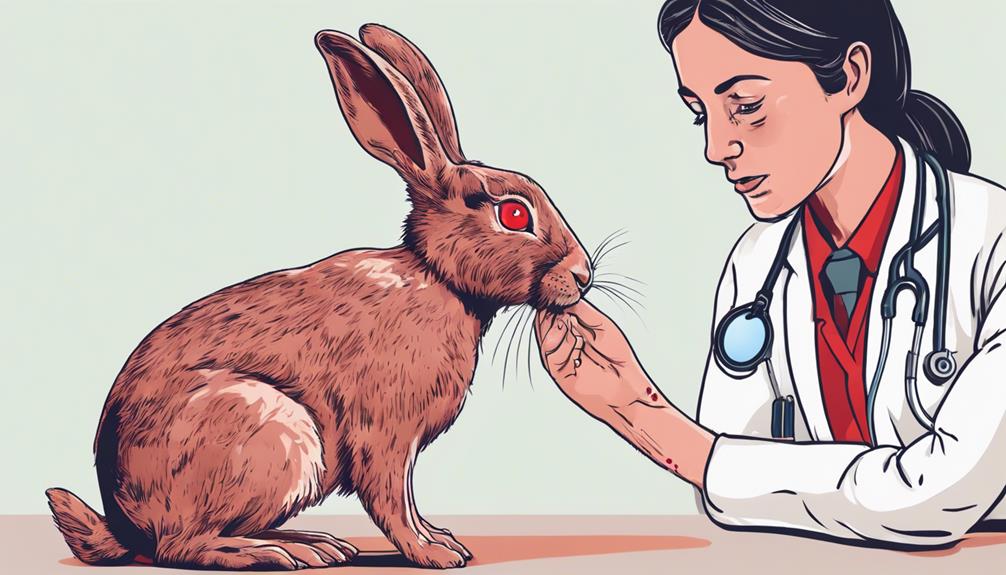10 Tips: Understanding Human Allergies to Rabbits
If you want to grasp how rabbit allergies impact you, grasp how proteins in rabbit dander and saliva spark reactions. Rabbit dander holds tiny skin specks that can float and settle. Common symptoms include sneezing, itchy eyes, and skin rash. Severe cases might worsen asthma. Testing confirms triggers. Reduction involves grooming and filters. Allergens are in saliva, urine, skin, fur, and dander. Even hypoallergenic breeds emit allergens. Skin tests identify allergies. Treatment includes meds and immunotherapy. Crafting a rabbit-friendly space is vital. Managing allergies lessens exposure. Knowledge about allergies aids in control and prevention.
Allergy Triggers in Rabbits
If you're prone to allergies, certain proteins found in rabbit dander and saliva can act as triggers for your symptoms. Rabbit dander consists of tiny, microscopic flecks of skin that rabbits shed regularly. These particles can become airborne and settle on various surfaces in your home, triggering allergic reactions when inhaled. Additionally, proteins in rabbit saliva can stick to the dander, further exacerbating symptoms when the allergens come into contact with your skin or respiratory system.
To prevent rabbit allergies, it's crucial to minimize your exposure to rabbit dander and saliva. Regular grooming and bathing of your pet rabbit can help reduce the amount of dander present in their fur. Using a high-efficiency particulate air (HEPA) filter in your home can also help trap airborne allergens, including rabbit dander. It's advisable to designate a specific area in your home for your rabbit to minimize the spread of dander and saliva. Furthermore, washing your hands after handling your rabbit and avoiding touching your face can help prevent allergic reactions.
Understanding the sources of allergens in rabbits and taking proactive measures to reduce exposure can significantly alleviate allergy symptoms. By being mindful of the presence of rabbit dander and saliva, you can create a more allergy-friendly environment for both you and your furry companion.
Symptoms of Rabbit Allergies
Common symptoms of rabbit allergies include sneezing, nasal congestion, itchy or watery eyes, skin rash, and in severe cases, asthma exacerbation. When exposed to rabbit dander, individuals sensitive to these allergens may experience these symptoms due to their immune system overreacting to the perceived threat. If you suspect you have rabbit allergies, it's advisable to seek allergy testing to confirm the specific allergen triggers.
Allergy testing can help identify whether rabbit dander is the cause of your symptoms. Through skin prick tests or blood tests, healthcare providers can determine if you have an allergic reaction to rabbits. Once diagnosed, it's essential to manage your symptoms effectively. Treatment options for rabbit allergies usually include avoiding exposure to rabbits or their dander. Regular cleaning of living spaces and using air purifiers can also help reduce allergen levels in the environment.
If you experience symptoms of rabbit allergies, such as sneezing, nasal congestion, or itchy eyes, it's crucial to consult with an allergist for proper evaluation and management. In severe cases where allergies lead to asthma exacerbation, immediate medical attention may be necessary. By understanding the symptoms of rabbit allergies and seeking appropriate allergy testing and treatment, individuals can effectively manage their allergies and improve their quality of life.
Common Rabbit Allergens
Rabbit allergens primarily originate from proteins found in rabbit saliva, urine, and skin cells that can trigger allergic reactions in sensitive individuals. Rabbit fur and dander are common sources of allergens that can become airborne and easily inhaled, leading to symptoms like sneezing, nasal congestion, and itchy eyes in susceptible individuals. These allergens can also settle on surfaces and remain present for extended periods, continuing to cause allergic reactions even when the rabbit isn't nearby.
In addition to fur and dander, rabbit saliva and urine are significant allergens that can cause reactions in sensitive individuals. When rabbits groom themselves, they spread saliva on their fur, which can then dry and become airborne, contributing to indoor allergen levels. Similarly, rabbit urine contains proteins that can trigger allergic responses when inhaled or upon contact with the skin.
It's essential to note that even rabbit breeds marketed as hypoallergenic can still produce allergens, as these proteins are primarily sourced from saliva, urine, and skin cells rather than the fur itself. Understanding these common rabbit allergens can help individuals take proactive measures to minimize exposure and manage symptoms effectively.
Diagnosing Allergies to Rabbits
When diagnosing allergies to rabbits, healthcare professionals typically employ a combination of medical history assessment and allergy testing to accurately identify the specific allergen triggers affecting an individual. Medical history assessment involves gathering detailed information about symptoms, their onset, and potential triggers. This step helps in narrowing down the possibilities and guiding the subsequent allergy testing.
Allergy testing is crucial in diagnosing rabbit allergies. Skin prick tests and blood tests are commonly used methods. Skin prick tests involve placing a small amount of rabbit allergen on the skin and then pricking the skin to see if a reaction occurs. Blood tests measure the levels of antibodies produced in response to rabbit allergens. These tests help confirm the presence of specific rabbit allergies.
Once diagnosed, treatment options for rabbit allergies may include medications to alleviate symptoms such as antihistamines or nasal corticosteroids. In severe cases, allergen immunotherapy (allergy shots) may be recommended to desensitize the individual to rabbit allergens over time.
To prevent allergic reactions, individuals allergic to rabbits should consider creating a rabbit-friendly home. This may include keeping rabbits outdoors, using HEPA air filters, regularly cleaning the living space, and washing hands after handling rabbits. These measures can help reduce exposure to rabbit allergens and minimize allergic reactions.
Managing Rabbit Allergies
To effectively manage rabbit allergies, it's important to adopt practical strategies that minimize exposure to allergens and alleviate symptoms. When dealing with rabbit allergies, allergy management is crucial. Firstly, consider creating an allergy-free zone within your home where your rabbit isn't allowed to enter. This can be particularly beneficial in areas where you spend a lot of time, such as your bedroom or living room. Investing in a good air purifier with a HEPA filter can also help reduce allergens circulating in the air.
Regular and thorough cleaning of your rabbit's living space is essential. Use a vacuum cleaner with a HEPA filter to trap allergens effectively. Additionally, washing your hands after handling your rabbit and avoiding touching your face can help prevent allergic reactions. When it comes to rabbit care, grooming your rabbit regularly can significantly decrease the amount of loose fur and dander in your home.
If you suffer from severe allergies, wearing a mask while cleaning your rabbit's cage or interacting with your pet can provide added protection. Consulting an allergist for personalized advice and treatment options is recommended for those with persistent symptoms. By incorporating these allergy management techniques and maintaining proper rabbit care, you can minimize the impact of rabbit allergies on your health and continue to enjoy the companionship of your furry friend.
Cross-Reactivity With Other Allergies
Understanding cross-reactivity with other allergies is essential for individuals managing rabbit allergies to effectively address potential triggers and symptoms. Cross-reactivity can occur between rabbit allergens and other allergens present in the environment or food, leading to heightened allergic responses. One common form of cross-reactivity is with pollen. If you're allergic to certain pollens, you may experience exacerbated symptoms when exposed to rabbits due to shared proteins between pollen and rabbit dander. This can result in increased sneezing, itching, or respiratory issues.
Moreover, individuals with rabbit allergies may also have food sensitivities that can cross-react with rabbit proteins. Some proteins found in rabbit meat, for instance, may trigger allergic reactions in sensitive individuals, causing symptoms such as hives, digestive disturbances, or even anaphylaxis. It's crucial for individuals with rabbit allergies to be aware of these potential cross-reactivities to effectively manage their condition.
If you suspect cross-reactivity between your rabbit allergy and other allergens, consider consulting an allergist for comprehensive testing and personalized advice. Identifying these triggers can help you develop a targeted management plan to minimize exposure and alleviate symptoms. By understanding how rabbit allergies can cross-react with pollen or certain foods, you can take proactive steps to better control your allergic responses and improve your quality of life.
Prevention Strategies for Rabbit Allergies

Given the potential for cross-reactivity with other allergens, implementing preventive measures is key in managing rabbit allergies effectively.
To help you prevent and reduce allergic reactions to rabbits, consider the following strategies:
- Allergy prevention: Focus on lifestyle changes that can help minimize exposure to rabbit allergens. This may include designating specific areas in your home as rabbit-free zones, using air purifiers with HEPA filters, and washing your hands thoroughly after handling rabbits.
- Rabbit friendly products: Opt for products that are specifically designed for individuals with allergies to rabbits. This can include hypoallergenic bedding materials, air fresheners that neutralize pet odors, and cleaning solutions that are gentle on sensitive skin.
- Environmental modifications: Make changes to your living environment to create a more allergy-friendly space. This could involve investing in hardwood or laminate flooring instead of carpets, regularly vacuuming and dusting to remove allergens, and keeping rabbits out of bedrooms to ensure a good night's sleep.
Rabbit Breeds and Allergenicity
Implementing proper preventive measures is essential when considering the allergenicity of different rabbit breeds. When comparing rabbit breeds for allergenicity, it's crucial to understand that all rabbits produce allergenic proteins found in their dander, saliva, and urine. However, certain breeds may produce lower levels of these allergens.
Genetic factors play a significant role in determining the allergenicity of rabbit breeds. Some breeds are genetically predisposed to produce higher levels of allergenic proteins, making them more likely to trigger allergic reactions in sensitive individuals. Breeds like Angoras and Lops are known to produce higher levels of allergens compared to breeds such as Rex or Himalayan rabbits.
When considering rabbit breeds and their allergenicity, it's essential to recognize that individual sensitivity varies. While certain breeds may generally produce lower allergens, individuals with severe allergies may still react to them. It's crucial to interact with different rabbit breeds before making a decision, as personal sensitivity plays a crucial role in determining the suitability of a specific breed.
Impact of Rabbit Allergies on Health

When considering the impact of rabbit allergies on health, it's important to acknowledge how allergic reactions can significantly affect an individual's well-being and quality of life. Allergic reactions to rabbits can manifest in various ways, leading to potential health implications that may disrupt your daily routine and overall wellness. Here are some key points to consider:
- Physical Symptoms: Allergic reactions to rabbits can result in a range of physical symptoms such as sneezing, itching, skin rashes, and difficulty breathing. These symptoms can be distressing and uncomfortable, impacting your ability to function normally.
- Emotional Strain: Dealing with rabbit allergies can also take a toll on your emotional well-being. Constant discomfort and the need to manage allergic reactions can lead to feelings of frustration, irritability, and even anxiety or depression over time.
- Quality of Life: The health implications of rabbit allergies can affect your quality of life in significant ways. From limiting your interactions with rabbits to avoiding places where they're present, these allergies may prevent you from fully enjoying activities or environments you once loved.
Understanding the potential impact of rabbit allergies on your health is crucial in managing your well-being effectively.
Seeking Professional Help for Allergies
To address rabbit allergies effectively, consulting a healthcare professional is essential for accurate diagnosis and personalized treatment options. Allergy specialists are trained to identify specific triggers causing allergic reactions, including those related to rabbits. Scheduling a consultation with an allergy specialist can provide you with professional advice on managing your allergies and exploring various treatment options.
During your consultation with an allergy specialist, you can expect a thorough evaluation of your symptoms and medical history. The specialist may conduct allergy tests to pinpoint the exact allergen causing your reactions, which could include rabbit dander or saliva. Based on the results, the specialist will work with you to develop a personalized treatment plan tailored to your specific needs.
Professional advice from an allergy specialist may include strategies to minimize exposure to rabbit allergens, such as keeping rabbits out of certain areas of your home or using air purifiers. Additionally, the specialist may recommend medications to alleviate your symptoms, such as antihistamines or nasal corticosteroids. In severe cases, allergen immunotherapy (allergy shots) could be suggested to desensitize your immune system to rabbit allergens over time.
Frequently Asked Questions
Can Rabbit Allergies Develop Suddenly in Adults?
Yes, rabbit allergies can develop suddenly in adults. Allergy triggers like rabbit dander and saliva can cause symptoms such as sneezing, itching, and nasal congestion.
Treatment options include antihistamines and nasal steroids to alleviate symptoms. To prevent reactions, minimize exposure to rabbits, keep living areas clean, and use air purifiers.
If you suspect an allergy, consult an allergist for proper diagnosis and management.
Are There Any Hypoallergenic Rabbit Breeds Available?
If you're considering a hypoallergenic rabbit breed, it's essential to know that no rabbit is entirely allergy-proof. However, some breeds like Rex, Mini Rex, and Himalayan are known to produce fewer allergens.
Allergy testing can help identify specific triggers. To prevent reactions, keep the rabbit's living area clean, groom them regularly, and consider air purifiers. When selecting a rabbit, consult with breeders and choose one with shorter fur to reduce allergen exposure.
Do Rabbit Allergies Worsen With Prolonged Exposure?
If you're wondering if rabbit allergies worsen with prolonged exposure, the answer can vary. Allergy prevention strategies like using air purifiers can help reduce symptoms. Additionally, your immune system may adapt over time through desensitization techniques.
Monitoring symptoms and consulting with a healthcare provider can provide insights on managing rabbit allergies effectively. Remember to consider these approaches to mitigate the impact of prolonged exposure on your allergies.
Can Rabbit Allergies Be Passed Down Genetically?
If you wonder about rabbit allergies being genetic, they can indeed have a genetic predisposition. While genetic factors play a role, environmental triggers like exposure to rabbit dander can exacerbate allergies.
Allergy testing can help identify the specific triggers. Preventative measures such as keeping rabbits away from living areas or using air purifiers may help manage symptoms.
Consulting with a healthcare provider can provide personalized guidance on managing genetic allergies to rabbits.
Is There a Cure for Rabbit Allergies, or Only Management Options Available?
When it comes to rabbit allergies, there isn't a cure available yet. However, you have various allergy treatments and management options to ease symptoms.
From antihistamines to nasal sprays, there are alternatives to help you cope with rabbit allergies. Prevention tips like using air purifiers and keeping rabbits out of bedrooms can also minimize allergic reactions.
Remember to consult with a healthcare professional for personalized advice on managing your rabbit allergies effectively.
Conclusion
In conclusion, understanding human allergies to rabbits is crucial for managing symptoms and preventing reactions. By identifying common allergens, recognizing symptoms, and seeking professional help when needed, individuals can better cope with rabbit allergies.
Remember to implement prevention strategies, such as keeping rabbits out of certain areas and regularly cleaning their living spaces. With proper care and awareness, it's possible to enjoy the companionship of rabbits without experiencing allergic reactions.
